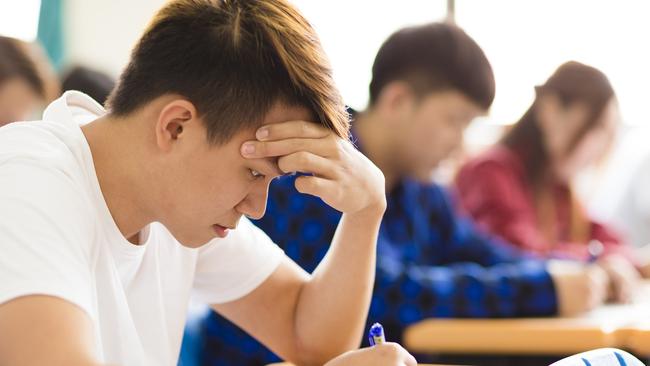ANU paper says China is likely to further restrict studying in Australia
A new paper from the ANU’s National Security College warns China is likely to further restrict its students from studying in Australia.

A new paper from the Australian National University’s National Security College warns China is likely to take further action to restrict its students from studying in Australia.
The paper, to be released on Wednesday, says education is Australia’s only remaining export to China valued at more than $10bn a year that Beijing can target without doing significant harm to itself.
At the same time, the paper says, action by China to reduce the flow of students will do major damage to Australia for two reasons.
First, Australian universities and other education providers do not have alternative markets available to replace Chinese students.
Second, the paper says, international education creates a large number of jobs in Australia and international student revenue funds research that is closely linked to Australia’s economic competitiveness.
“Coercion against the sector would significantly impact Australia’s prosperity,” the paper says.
Titled Protecting Education Exports: Minimising the Damage of China’s Future Economic Coercion, the study warns that the Chinese government is unlikely to be restrained from restricting access to Australian education by fear of upsetting its middle class (who send their children overseas to study).
“Beijing has shown a willingness to restrict popular Australian products for its middle class in this trade dispute — clean affordable meat, wine and other agricultural products,” authors Dirk van der Kley and Benjamin Herscovitch point out.
They also note that many other countries offer high-quality university education, which gives China’s middle class alternatives to Australia.
The report also notes several methods the Chinese government could use to reduce the flow of students to Australia, including pressuring education agents to send students elsewhere, fostering negative views of Australia and ending the official recognition of Australian qualifications in China.
“Under any scenario, the number of students is unlikely to trend to zero but a precipitous drop is possible,” it said.
The report notes that, before COVID, Australia had four exports to China worth more than $10bn. Iron ore was worth $63bn in 2018-19, natural gas was worth $17bn, coal was worth $14bn and education was worth $12bn.
“Of those, coal is already restricted by Beijing. There is currently no other similarly reliable source of high-quality iron ore for China. Gas restrictions would give China’s gas importers short-term headaches as they rearrange supply. But Australia could also find alternate markets to sell gas. There is no easy alternate export market for Australian education,” the report says.
The authors urge the government to respond by boosting the resources available to market Australian education and make a major diplomatic effort to diversify source countries for students.
“As part of the COVID-19 Relief and Recovery Fund, the Australian government should consider providing Austrade with additional funding of $20m to develop and launch an Education Australia export promotion brand in FY21-22,” the paper says.
It also calls on the government to establish a position of ambassador rank to promote Australian education, with the appointee heading a new unit inside the Department of Foreign Affairs and Trade called the Office for Education Trade Diversification.
The position would be similar to Britain’s recently created role of international education champion. The paper says a key focus for the new ambassador should be emerging education markets across the Indo-Pacific and Africa.
“The ambassador would regularly lead delegations of senior university leaders and prominent academics to target markets,” it says. The new DFAT unit would also bring political leaders, celebrities and social media influencers from high-growth markets to Australia to tour universities and other education providers.




To join the conversation, please log in. Don't have an account? Register
Join the conversation, you are commenting as Logout